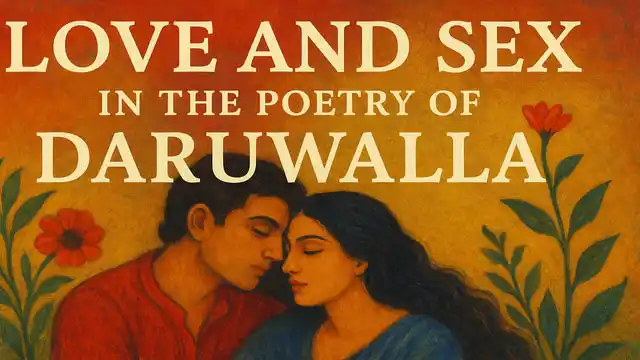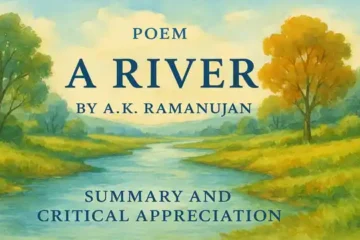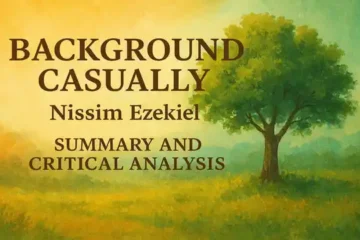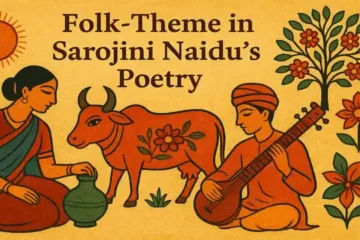Introduction:
Keki N. Daruwalla, one of the most distinguished voices in contemporary Indian English poetry, explores a wide range of human emotions and experiences with remarkable intensity and precision. Love and sex in poetry of Daruwalla is found.. Among his recurring themes, love and sex occupy a significant place, revealing his deep understanding of human passion, desire, and emotional complexity.
In Daruwalla’s poetic universe, love is not merely a romantic or sentimental feeling—it is an elemental force that binds and breaks, that unites body and spirit, and that mirrors the cycle of life itself. His treatment of sex is equally nuanced; it is not portrayed as vulgar or purely physical, but as a natural and vital expression of human existence.
Through poems such as those in Crossing of Rivers and other collections, Daruwalla fuses sensuality with spirituality, depicting love as both a celebration and a source of existential reflection. His approach to love and sex thus bridges the personal and the philosophical, the physical and the transcendental, making his poetry both profoundly human and distinctly Indian in sensibility.
Love and Celebration of Sex in Daruwalla’s Poetry:
Daruwalla glorifies love and celebration of sex as a typical Indian. Crossing of Rivers is a serious and thoughtful poetic statement on the theme of love. It is a well-knit poem with a calculated beginning and a circular end. During one of his crossings the youth fall in love with the fisher girl, who later becomes the mountain girl. Another crossing comes in the autumn of their lives—that of separation from each other for good. In between these two crossings are moments of experiencing the ecstasy of love:
“Why, installing a mistress
is like installing a deity in the house!”
As she has been a vagrant child of nature, she does not want confine herself to social and domestic responsibilities:
“She didn’t want children
for a concubine’s children cannot offer
to their ancestors
limps of boiled rice.”
She, thus, embodies both love and detachment, love that is devoid of sexuality. Daruwalla has given a new dimension to the theme of love. Love can flower within without any physical contact.
Poignant Love in “Death of a Bird”:
Death of a Bird is a poignant love poem which expresses intense and self effacing love between two monals who “mated, clawed and screamed” under an overhang of crags:
“the female brown and nondes-crift
the male was king, a fire-dream!”
The hunter mercilessly killed the King (male) monal. The female monal “rose, in terror crying.” The hunter and his beloved intensely desired to enjoy love in moonlit night but their dream of “quiescence and love” was upset by the moaning voice of the female monal whom the cruel hunter also killed in “an ash grey dawn”. His wife was terrified at the sight of the female monal” near dead/its eyes flared terror like hits of driffing meat.
People who separate lovers can never enjoy the ecstasy of love. They have to suffer the nemesis of their guilt.
Critique of Growing Sexuality in Modern India:
Daruwalla lashes at the growing sexuality in India. The naked display of sex and sexuality after the European style is immoral. To them sex is merely a source of recreation and of exchanging sensations, heavings and sighings. Even the old leaders suffer from sexual perversion which grips modern society:
“He is an old leader after all
Who has gone thrice to jail
—twice for home-rule
and once for sodomy.” [Food and Words, Words and Food]
A man of fifty commits suicide in one of his poems because he failed to seduce a school girl. The poet has a dig at the Indian youths who mostly possess unclean and sensual thoughts, and who always remember that “between the novel and the knees is the taboo region.” Rotarian Renu takes pleasure in displaying her fleshy parts which excite male sexuality.
“She shows to advantage her razor-shaped legs
Chipped portions of Kegs
Her torso—the oft quoted “double fried egg”
Conjugal Love in “The Unrest of Desires”:
The Unrest of Desires, one of Daruwalla’s finest love poems, depicts the pleasures of conjugal love. Sex is important in connubial life. It leads to intimacy, warmth of relationship and ultimately to love. The wife silently calls her husband to have sex with her when children sleep. The poet gives a vivid and lively description of their love making:
“Suddenly/she is in my arms/swarming
Her nipples and the grass outside/harden together,
tense with coming thunder
Kissing her on the neck
I nibble the words as they slur across her skin
…………………………………………………..
As if in reply/she presses me harder to herself
I enter her/the way a boat starved of
fresh water/enters a harbour.”
Changing seasons arouse different kinds of feelings in the husband’s mind. In rainy season he is in a jovial and buoyant mood. In July morning he sees queer newness and freshness on his wife’s face. “She is a coriander leaf/newly plucked/rain washed.” He is possessed of voluptuous and sensual desires:
“And I reach over for her/soft and willing and
naked/and slowly rhythmic.”
Sensual Imagery in “Love among Pines”:
Love among Pines recollects love-experiences of the poet, who while enjoying a walk with his wife, catches sight of some sensuous scenes which make him whisper:
“destiny lies/in parting of hair/in the parting of
grasses/in the parting of thighs.”
In this poem the poet realistically depicts a consumable picture of the process of copulation, moods and feelings which grip a couple during the moments of sexual realization.
Celebration of Physical Union in “From the Snows in Ranikhet”:
From the Snows in Ranikhet addresses his newlywed friend and advises him how to make maximum use of physical pleasure. It is full of sensual and voluptuous thoughts. Advising his friend how to celebrate the first night of union he says:
“Just dig through too white feet of silence
till you hit the ground.”
How physical union creates new life on earth is described in the following lines:
“But the goddess of the seasons
still chews her comic end
Her mastication brings forth green leaf and golden bud
Fish will erupt from larval beds
and go downstream with the flood.”




